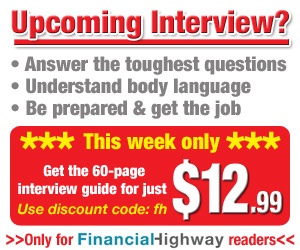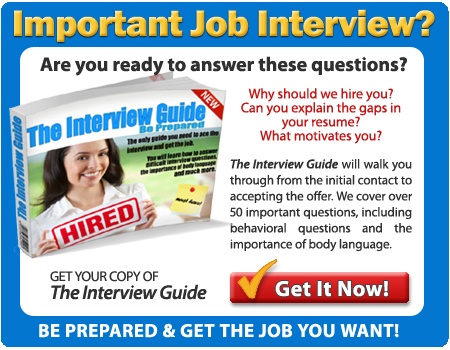- 15shares
- Facebook10
- Twitter2
- Pinterest1
- Google+2
Q: What is your dream job?
An alternative to this question is “what are you looking for in a job”? Either way it is asked you should basically explain the job that you’re applying for without coming right out and saying it. For example, if you’re applying for a management position in a green company then you might say that your dream job is one that is in line with your earth-friendly lifestyle and allows you to demonstrate leadership skills in a team setting. You may note that you want a fair rate of pay but that salary is less important than those other qualities.
Q: Have you ever worked in a job that you hated?
Of course you have, but you don’t want to focus on negative things in this interview. You should briefly say that there was a job that your skills weren’t matched for but that at least it gave you an opportunity to learn something new about yourself that has allowed you to find positions that suit you better. Make sure that whatever example you give is very different from the position that you’re applying for now!
Q: Is there anyone you would refuse to work with?
You want to come off as amenable here but also as someone with values. Answer briefly that you would struggle to work with someone who broke the law or even major company policies, but that, in general, you find most people easy to work with. Explain how you would deal with a tough situation like this if it did come up.
Q: Are you willing to make sacrifices for this company?
There are variations on this question such as “how do you balance work and home” or “would you be willing to work overtime” or “can you relocate if required”? Basically, you want to keep any answer brief and be agreeable but honest. If you truly can’t work overtime or go the extra mile, then you need to be honest about that in your interview so you don’t trap yourself into a responsibility that you can’t handle. A good answer in such an instance is that you are fully able to meet all of the stated responsibilities of the job, that you deal with your personal life on your own time, and that you would be happy to review specific situations on a case by case basis as they emerge to give as much as you can to the company.

Q: What is your expected rate of pay?
This is a tricky question. You can approach it in one of two ways. The first is to sidestep the question by saying something along the lines of, “rather than discussing salary I am really most interested in discussing the requirements and expectations of the position”. Alternatively, you can answer by saying that you believe that someone with your experience and education should receive a salary in the range of (whatever the range is, which you should research) but add that you’re willing to be flexible and to discuss the details further if you are offered the position.
Q: What was your starting and ending rate of pay at your last position?
Clearly you have to be honest here, but what you want to highlight is your growth during your time at the company. You may want to mention a promotion, a change in title, or a reward, even if it didn’t lead to a corresponding rate increase.
Q: Do you know anyone who works with our company?
Make sure that if you are applying at a place where you know an employee then you’ve fully researched their policies in advance in regards to hiring relatives. In your answer, you should say that you do know someone and then explain that you know the policy. If you don’t know anyone at the company you should say this and then briefly explain how you know about them or what you’ve heard about the company in general.
Q: What other applications have you put in?
Many people are unsure about how to answer this common interview question because they don’t know exactly what the point is of this question. Well, here’s the clue that you need: the point is that you’re actively looking for work in the field. You should mention a few big names in the industry that you’re interested in working with to show that you know the field and are pursuing work with important companies. Then you should reiterate exactly why you want to work with this company over the competition.
Q: Why should we hire you?
This is a question that sometimes comes at the beginning of the interview but it’s usually used as a wrap-up question, and you should treat it as such. Summarize the key points that you’ve already made throughout the rest of the interview. Focus specifically on what your greatest strength is and how this is exactly in line with what the company is looking for. Emphasize the relevant education and experience. You may want to add that you have felt very comfortable at the interview and believe that you will mesh well with the company atmosphere. It never hurts to combine a little bragging with a little bit of soft schmoozing at this point!
Q: What will you do if you don’t get this position?
You want to stay positive. Answer that you hope that you’ll get the position but if the company finds another candidate for the job then you will move forward in finding a similar position in another company. Note that you hope they would keep your resume on file in case something lines up better in the future.
Q: Do you have any questions?
One huge interview mistake that you can make is to say “no” to this common interview question that is typically answered at the very end of the interview. Employers may mistake this for a lack of interest in the job or even a lack of intelligence on your part. Before the interview, come up with a general question that you can ask about the company. For example, you might ask what the interviewer thinks are the best benefits and biggest drawbacks of the job. However, listen carefully during the interview to see if there are any other genuine questions that come up for you. Don’t hesitate to ask these when this common interview question is posed.
Want to secure that job? Get the complete Interview Guide that walks you through the initial contact till the signing of the offer letter plus covers over 50 interview questions! You can now get the ultimate Interview Guide for $12.99 ONLY THIS WEEK! This guide covers much more than just interview questions, it is over 60 pages long and a MUST have if you are in the job market. Upon check out just enter code fh and you’ll see your discount. Good luck!


